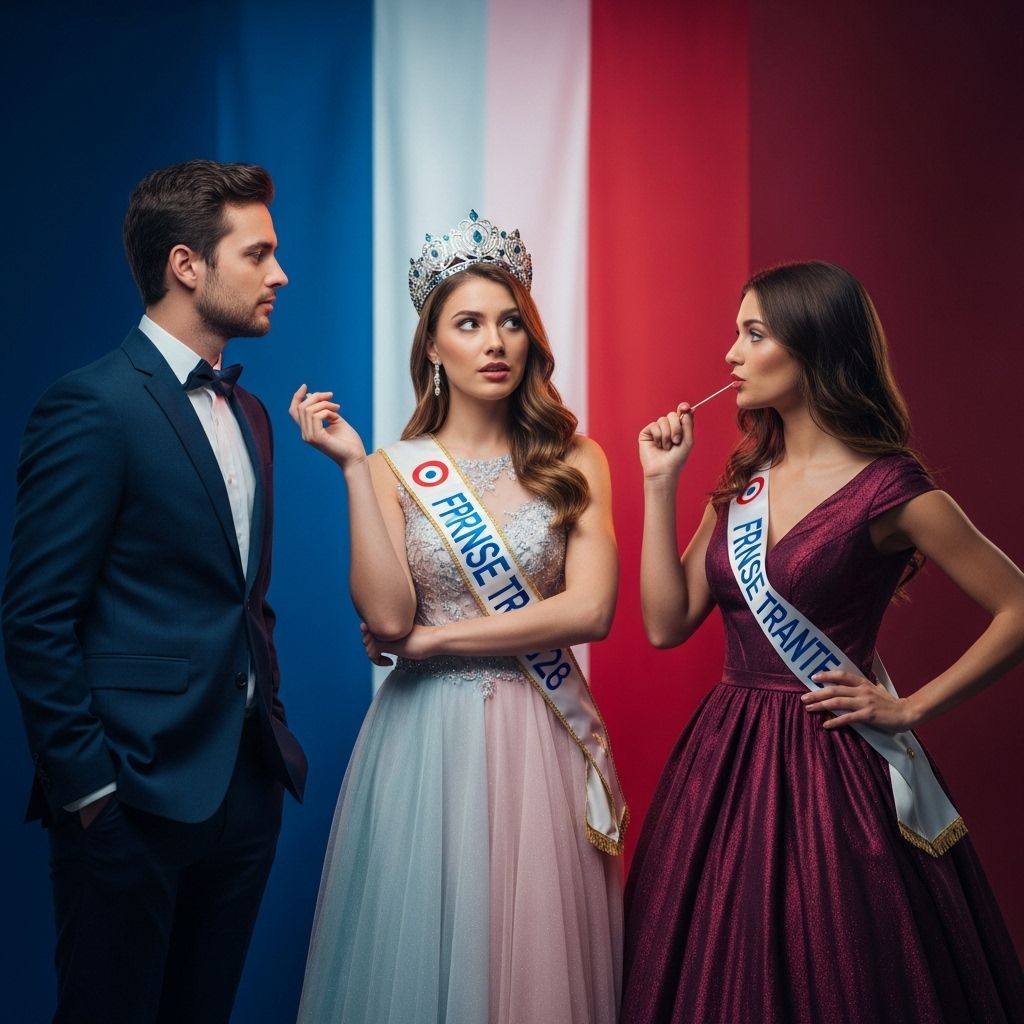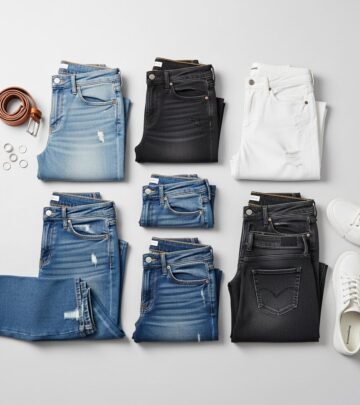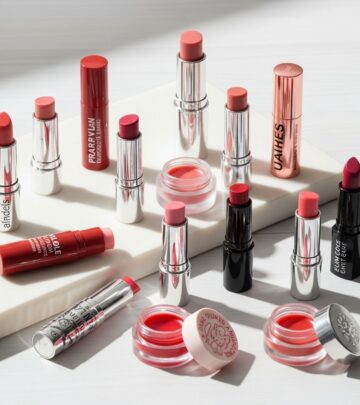France’s Beauty Pageants: A Culture in Conflict and Change
Explore the evolving debates, cultural shifts, and controversies surrounding France’s iconic beauty pageants, from Miss France to alternative contests.

France’s Enduring Obsession with Beauty Pageants
France possesses a unique, enduring relationship with beauty contests—sophisticated productions that command national attention and remain highly popular despite mounting criticism over their ethics, relevance, and treatment of participants.
While the United States has seen a steep decline in pageant viewership, French audiences remain devoted: the annual Miss France contest draws millions of viewers, making it a steadfast fixture in pop culture and national identity.
But beneath the glamour lies growing societal debate, as pageants bluntly reflect and perpetuate French attitudes about femininity, sexuality, diversity and modernity.
The Appeal and Ritual of Miss France
With extravagant staging, glitzy gowns, and live broadcasts, Miss France is more than an event—it’s a cultural institution.
Each winter, women from across the country parade the stage in a dazzling variety of costumes, swimwear, and evening dresses, vying not simply for a crown, but for the title of national icon.
For months leading up to the show, contestants participate in photo shoots, rehearsals, and interviews, culminating in a highly anticipated televised spectacle.
Last year, over 8 million viewers watched the coronation of the new Miss France, underscoring the pageant’s ongoing mass appeal.
Key Highlights of Miss France:
- High Production Value: Large-scale live event, elaborate sets and choreography.
- Fiercely Competitive: Regional winners advance to the national final, competing across several categories.
- National Pride: Represents French ideals of beauty, elegance, and poise.
Child Pageantry, Controversy, and Legislative Crackdown
French society’s deep attachment to beauty contests came under scrutiny following a controversial French Vogue spread featuring a heavily styled and sexualized 10-year-old. The public response was swift: concern about the psychological impact on children prompted nationwide debate over premature sexualization and objectification.
Mini Miss competitions, popular children’s pageants, became the focus of media criticism, eventually leading to legislative intervention.
In 2014, France enacted laws prohibiting beauty pageants for children under 13, with heavy fines and prison sentences imposed on adults who attempt to circumvent the ban.
Pageants for ages 13–16 are subject to additional regulations and penalties, aiming to curb the exploitation and hypersexualization of youth on the national stage.
- Banned: Beauty pageants for children under 13 years old
- Severe Penalties: €30,000 fine and up to two years’ imprisonment for violators
- Additional Restrictions: For 13–16 age group, tighter rules and fines up to €1,500
Sexualization, Feminism, and Critique of Miss France
Despite legal reforms concerning child contestants, criticism continues to dog Miss France. Teenaged participants—most still in high school or university—undergo rigorous styling with dramatic makeup, corseted gowns, and even a full-day bikini photo shoot.
While the pageant maintains that its photo sessions are “sexy but not vulgar,” media outlets and feminist groups argue that the contest perpetuates harmful stereotypes and unreasonable standards.
The focus on physical beauty, body measurements, and aesthetic conformity has galvanized feminist activism. Leading group Osez le Féminisme! took legal action in recent years, labeling eligibility requirements as outdated, discriminatory, and out of step with modern values.
- Physical Standards: Historical requirements included being taller than 1.70m, unmarried, and without children.
- Public Criticism: Media, activists, and government officials have questioned the contest’s messaging and impact.
- Bikini Photo Shoots: Unique to Miss France, contestants participate in extensive, stylized swimwear sessions.
Legal Battles and Partial Reform
The debate intensified when Miss France came under legal fire for alleged violations of labor law and discrimination. Feminist plaintiffs argued that restrictive rules—such as height, marital status, and maternity policies—amounted to illegal and exclusionary recruitment practices.
Judicial outcomes have been mixed: a Paris labor court ultimately sided with pageant organizers, declaring that the eligibility criteria did not violate employment law. Nonetheless, critical voices persist, and recent changes reflect attempts to modernize and address criticism.
- Loosening Rules: Restrictions on height, marital status, and motherhood have been lifted. Nowadays any woman above the age of 18, regardless of height or child-bearing status, may enter.
- Visible Tattoos: Now permitted for contestants, signaling evolving attitudes.
- Transgender Inclusion: Transgender women with female civil status records are now eligible to compete.
- Judicial Backing: Recent court decisions favor pageant organizers, but appeals and further legal disputes remain possible.
Alternative Pageants: Celebrating Diversity and Normalcy
Rising calls for inclusivity have led to the proliferation of alternative beauty competitions throughout France. These contests challenge the traditional aesthetics and rigid conventions of Miss France, providing an avenue for women of varying shapes, sizes, ages, and backgrounds to participate and be recognized.
This movement has spawned events like Miss Ronde France, which celebrates curvy women, and other regional or cause-focused pageants that value diversity, confidence, and social impact over classic glamour.
Miss Ronde France: Championing Body Positivity
- Entry Criteria: Open to women aged 16–60 who weigh at least six kilograms above their height less one meter (e.g., 160cm tall = 66kg minimum)
- Focus: Fatphobia, self-confidence, and social messaging are central to the competition’s mission
- Training: Contestants receive coaching in haircare, make-up, social media, and language skills
- International Opportunities: Winners compete in Top Curvy Universe in Spain and may secure modeling contracts
Contestants in Miss Ronde France often describe powerful feelings of solidarity and empowerment, emphasizing how the pageant builds self-esteem and challenges social stigma rather than reinforcing anxieties about appearance.
This contrast stands in opposition to the “trophy wife” branding sometimes associated with Miss France, broadening the definition of beauty celebrated by the public.
Key Differences: Miss France vs. Miss Ronde France
| Aspect | Miss France | Miss Ronde France |
|---|---|---|
| Eligibility | Women aged 18+; no height or child status restriction (recently reformed) | Women aged 16–60; minimum weight/height ratio required |
| Focus | Classic beauty, elegance, national representation | Body positivity, diversity, empowerment |
| Social Impact | Emphasis on public appearances, charity | Advocacy against fatphobia, moral support for population |
| International Links | Limited to European-level competitions | Winner may compete in Top Curvy Universe, with global exposure |
Modernization, Diversity, and Cultural Change
Under intensifying social pressure, Miss France has taken tentative steps to address criticisms. In recent editions, organizers have dropped most controversial rules and declared openness to a wider array of backgrounds.
Notably, the recent crowning of Miss France 2024—a winner with short hair—sparked internet debates but signaled a move towards embracing less formulaic standards of beauty.
This incremental reform mirrors ongoing cultural shifts in France around gender, representation, and social inclusion, though detractors argue the progress remains too gradual and superficial.
- Broadening Beauty Standards: Visible tattoos and unconventional hairstyles are no longer grounds for disqualification.
- Opening Doors: Mothers and transgender women with female status can now compete.
- Criticism Persists: Discussions continue regarding the ethics of selection, presentation, and the impact on self-image of contestants and viewers alike.
Sexualization and Ethics: The Ongoing Debate
Despite reforms, core questions endure: Are beauty pageants inherently objectifying, even with broader criteria? Does their existence nurture unrealistic or damaging social expectations, or can they evolve into genuinely empowering platforms?
Miss France continues to employ elaborate makeovers, staged glamour, and commercial sponsorship, with critics arguing these elements undermine claims of inclusivity or progressive values.
Conversely, alternative contests and the increasing diversity seen in contestants provide evidence that change—however incremental—is possible through sustained pressure, legal challenges, and cultural evolution.
Frequently Asked Questions (FAQs)
Q: Why do beauty pageants remain so popular in France?
A: The Miss France contest is deeply embedded in French culture, symbolizing ideals of elegance, national pride, and femininity. Its high production values and nationwide engagement sustain its appeal, even as debates over its social impact intensify.
Q: What prompted France to ban children’s beauty pageants?
A: Concerns about premature sexualization, psychological damage, and media scandals—such as a Vogue spread featuring a sexualized young girl—led lawmakers to prohibit pageants for children under 13 and reinforce protections for older minors.
Q: How have pageants changed in response to criticism?
A: Organizers have removed height, marital, and maternity restrictions, now welcoming contestants of all heights, mothers, and transgender women. Tattoos and unconventional looks are also accepted, reflecting attempts to modernize the contest.
Q: What alternatives exist to traditional contests?
A: France hosts alternative competitions like Miss Ronde France and other regional or themed pageants that celebrate diversity, individualism, and empowerment, rather than classical standards of beauty.
Q: Do beauty pageants empower women or reinforce stereotypes?
A: The answer remains contested. Proponents argue that pageants can boost confidence and create opportunities. Critics maintain they reinforce narrow, harmful ideals. The emergence of inclusive contests suggests a gradual shift toward empowerment and broader representation.
Conclusion: France at a Crossroads
French beauty pageants, with their storied history and televised grandeur, continue to spark intense debate. Today, the culture is divided between tradition and progressive reform—between the iconic Miss France and a rising wave of alternative competitions.
Though enduringly popular, the system is grappling with calls for inclusivity, legal scrutiny, and cultural evolution. Whether beauty pageants will maintain their hold on the national imagination, or fully reinvent themselves to reflect modern sensibilities, remains an open and vibrant question in France’s ongoing social conversation.
References
- https://frenchly.us/miss-france-hypocrisy-french-politicians-pageants/
- https://www.connexionfrance.com/news/alternative-french-beauty-pageants-celebrate-normal-women/266667
- https://www.lemonde.fr/en/france/article/2023/01/06/french-court-backs-miss-france-against-feminists_6010584_7.html
- https://www.cosmopolitan.com/uk/reports/a46162473/miss-france-winner-short-hair/
- https://www.cosmopolitan.com/style-beauty/beauty/news/a15653/france-beauty-pageants/
- https://www.smithsonianmag.com/smart-news/france-bans-child-beauty-pageants-america-unlikely-to-follow-10155596/
Read full bio of medha deb












